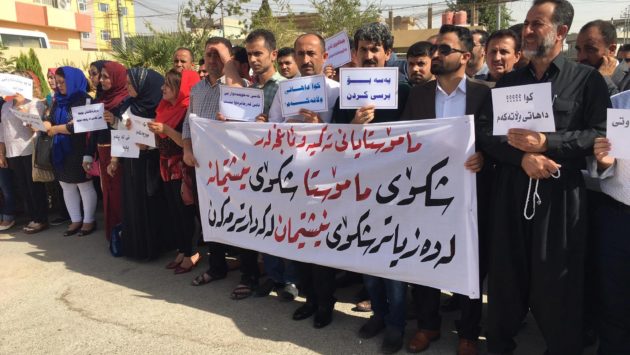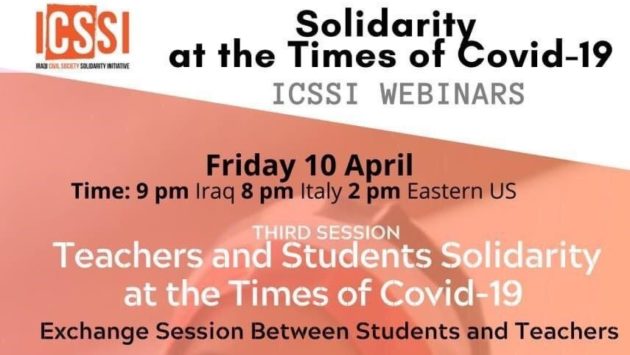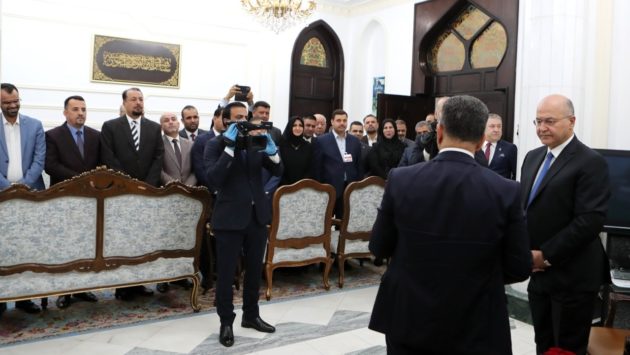There is No Military Solution to Violent Extremism
As a reaction to the deadly attacks by Daesh in Beirut and Paris, the Iraqi Civil Society Solidarity Initiative together with partners in Maghreb, Mashreq and Europe produced and disseminated the following call to action:
As we mourn for Paris, our thoughts and solidarity are with all victims of terrorism and war everywhere. Our solidarity and friendship is with all those who are living under and suffering violence: in Mali, Lebanon, in Syria, Libya, Iraq, DR Congo, Burma, Turkey, Nigeria and elsewhere. Terrorism, whether by a government or an organisation, is an aberration. It kills hope. It kills human beings. It must stop. We must stop it.
Extremism needs to be overcome. We stand in true solidarity with its victims everywhere. At the same time, we are concerned that true solidarity towards the victims of violent extremism is being used as a catalyst to repeat old mistakes and failed answers: using military strikes which escalate violence rather than measures which address the actual problems and could help to end terrorism and break the cycle of violence.
For the past decades, many of our governments have been at the centre of a succession of disastrous wars and military interventions that have brought devastation to large parts of North Africa and the Middle East. These have increased, not diminished, the threats to our own security as well as the security and stability of people in the region. Over-reliance on military attacks and armed responses fuels grievances, encourages violence and undermines peace. What is needed instead are real social and political solutions and practical measures to bring an end to violence and armed attacks. Military capacities are ill suited to address the drivers, dynamics and entrepreneurs of violence. The evidence is clear: political and peacebuilding processes which solve the real issues of inclusive governance, meet people’s needs, and guaranty real security for all are more effective than military interventions and bombing in reducing and ending violent extremism and terror.
Despite this evidence we are again seeing governments resort to armed responses and military strikes – causing further deaths of civilians, destruction of infrastructure in communities already ravaged by war, and reducing security for all. Investment and waste in military operations is costing all of our societies, while almost nothing is being invested in the real, practical measures needed to bring an end to the conflicts and support development, governance, humanitarian and human rights needs. Civilian agencies are stretched without even the minimum support necessary to address soaring humanitarian let alone development and governance needs.
We, the signers of this statement, organisations and citizens from around the world, call for a new, effective and responsible approach to overcome violent extremism and terrorism. It is urgent. We are starting a concerted effort to put an end to a reality that is causing so much pain, and a failure of policies that worsen rather than solve the conflicts they are meant to address. We urge citizens and leaders everywhere to act for:
1. Direct, sustained and committed efforts to bring an end to all wars, military occupations, invasions everywhere. This is lacking, and its absence fuels continued war, terrorism and violence. This needs to include authentic and dedicated diplomatic efforts as well as real and significant support to citizen peace movements working to end war and violence in their countries, prevent recruitment and facilitate disengagement from violent groups, promote peace education, overcome extremist narratives and promote reconciliation, dignity and respect for all people and communities. Peacebuilding offers a more effective and responsible answer and real solution to overcome violence, terrorism and war.
2. Actively promote respect for people’s beliefs and diversity: Religion is rarely the only factor that explains the rise of violent extremism. No religion is a monolithic entity. Religious motivations are usually interwoven with those that are socio-economic, political, ethnic and related to identities. Religion can be used to intensify conflicts or be a force for good. It is the way that beliefs are held and ideologies are exercised that makes the difference. Religious believers and people of all faiths and ideologies should be encouraged to actively engage in the pursuit of peace and reaching out across differences to build a better, safer future for all.
3. Promote quality and public education and access to culture: education and culture are vital for human development. Governments need to understand the link between education, culture, employment and opportunity, remove barriers and facilitate social mobility and connectivity. Religious educators need to offer people a firm grounding not only in their own religion but also in universal values and tolerance.
4. Promoting inclusive governance and human rights: Violent extremism thrives where there is poor or weak governance, or where the government is seen as illegitimate. Where these conditions persist, grievances are often left unaddressed, and frustrations can easily be channelled into violence. Preventing and countering violent extremism requires our governments to be open, inclusive and accountable, to guarantee the rights of minorities and to promote genuine commitment to practising democratic values and human rights.
5. Overcome poverty: Where systematic exclusion creates injustice, humiliation and unfair treatment, it can produce a toxic mix that allows violent extremism to flourish. We need to dedicate resources to address the drivers of grievances, such as injustice, marginalization, social and economic inequality, including gender inequality through programming and reforms focused on citizen participation in governance, rule of law, opportunities for women and girls, education opportunities, freedom of expression and conflict transformation.
6. Address global injustice: The vast majority of violent extremism is found in the context of entrenched and unresolved conflicts, where violence begets violence. Numerous studies have documented vicious and self-destructive cycles of revenge, economies of war, and ‘cultures of death’ in which violence becomes a way of life. Governments, citizens and international organisations must do everything in their power to break the political and institutional deadlocks that prevent conflicts from being resolved. We need to stop supporting military occupations, we need to end arms deals and business as usual with countries systematically violating human rights, we need to be able to offer responses to crisis and show proper solidarity: including providing robust humanitarian response to the refugee crisis and ensuring the needs for safety and protection for all people are met.
7. Rights-based bilateral relations: Uphold commitments to rights-based governance in all bilateral relations. All the assistance offered by our governments to other states to counter or prevent violent extremism must emphasize and ensure the protection of human rights, citizen security, and equal justice under law and integrate peacebuilding methods and approaches.
8. End trading in death: the arms trade to countries in the Middle East and North Africa and continued provision of weapons to countries using them against their own citizens or for armed attacks in other countries and fuelling militias and war must be stopped. We call for a complete halt in the arms trade and a review of codes of conduct and compliance agreements to ensure states and companies are upholding their responsibility to not be selling weapons to countries using them against civilians, or who will sell them on further to organisations using them in terror attacks.
We are the beginning of a global movement of citizens worldwide dedicated to overcoming terrorism and the terror of war and state killings. We will not stop until they are stopped. We are asking you – citizens, governments, organisations, and people of the world: join us. As citizens, as organisations, as human beings, this is our response, and our call to action.
FIRST SIGNATURES:
Association des Marocains in France
Association Marocaine des Droits Humains
Association Mauritanienne des Droits de l’Homme
AssoPace Palestina (Italy)
Coordination Maghrébine des Organisations des Droits Humains
Forum Marocain pour la Vérité et la Justice
Institut de Drets Humans de Catalunya
Iraqi Civil Society Solidarity Initiative
Ligue Algérienne pour la Défense des Droits de l’Homme
Ligue Tunisienne des Droits de l’Homme
NOVACT International Institute for Nonviolent Action (Spain)
Peace Action Training and Research Institute of Romania
Palestinian Centre for Human Rights
PAX (Netherlands)
Popular Struggle Coordination Committee in Palestine
Un Ponte Per… (Italy)
********
Read the statement in different languages, and add your signature now:





